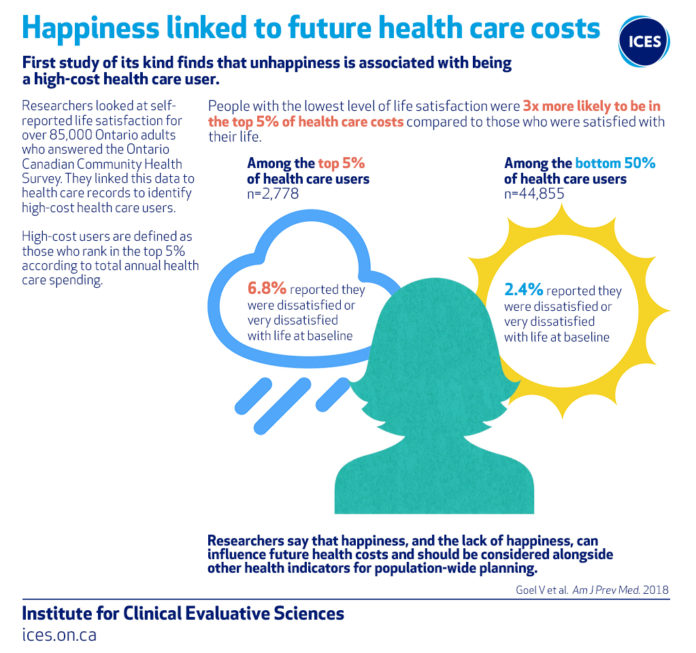Life dissatisfaction or unhappiness was significantly associated with being a high cost health care user in the future, according to a new study from the Institute for Clinical Evaluative Sciences (ICES).
In health care systems worldwide, high cost health care users disproportionately account for a majority of health care spending costs. High cost health care users are defined as those who ranked in the top five per cent according to total annual health care spending.
The study published today in the American Journal of Preventive Medicine, examined more than 85,000 Ontario adults whose self-reported life satisfaction was measured at baseline. They were then followed-up for six years to determine if they had enough health care use to put them in the highest category of health care costs. After accounting for other factors associated with high health care use, like demographic factors, co-morbidity and socioeconomic factors, the researchers found that those studied with the lowest level of life satisfaction were three times more likely to be in the highest category of health care costs compared to those who were satisfied with their life.
“There is an increasing focus on how happiness, and the lack of happiness, can influence future health outcomes. This is the first study that links satisfaction with life with future health care burden and costs,” says Dr. Vivek Goel, Scientist Emeritus at ICES and Professor at the Dalla Lana School of Public Health at the University of Toronto.
The researchers found a trend that the happier one was with life, the lower the odds of needing more health care.
“Increasingly, we need to consider factors beyond the health system and even beyond health behaviours and socioeconomic factors that can influence rising health care costs,” says co-author Dr. Laura Rosella, adjunct scientist and site director at ICES UofT and assistant professor at the Dalla Lana School of Public Health at the University of Toronto.
The researchers found that the top five per cent of high cost health care users used $27,636 average annual health care costs, compared to $3,393 and $386 in the top six to 50 per cent and the bottom 50 per cent respectively.
The findings support the health system impact of addressing broader well-being and happiness in the population.
“The relationship between life satisfaction and health care utilization: a longitudinal study” was published today in American Journal of Preventive Medicine.
Author block: Vivek Goel, Laura C Rosella, Longdi Fu and Amanda Alberga.




